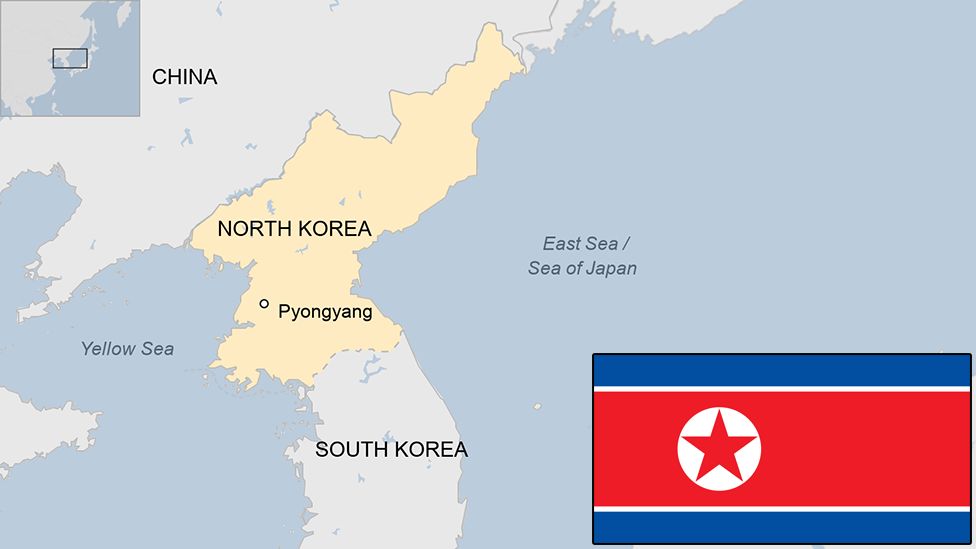North Korea country profile
- Published

For decades North Korea has been one of the world's most secretive societies. It is one of the few countries still under nominally communist rule.
North Korea's nuclear ambitions have exacerbated its rigidly maintained isolation from the rest of the world.
The country emerged in 1948 from the chaos following the end of World War Two. Its history is dominated by its Great Leader, Kim Il-sung, who shaped political affairs for almost half a century.
Decades of this rigid state-controlled system have led to stagnation and a leadership dependent on a cult of personality. The totalitarian state also stands accused of systematic human rights abuses.
- Read more country profiles - Profiles by BBC Monitoring
DEMOCRATIC PEOPLE'S REPUBLIC OF KOREA: FACTS
- Capital: Pyongyang
- Area: 120,540 sq km
- Population: 25.9 million
- Language: Korean
- Life expectancy: 68 years (men) 75 years (women)
LEADER
Supreme leader: Kim Jong-un
Kim Jong-un is the third leader from the Kim dynasty, founded by his grandfather Kim il-Sung.
Kim Jong-un took over from his father Kim Jong-il when the latter died of a heart attack in December 2011.
Under Kim Jong-un, North Korea has continued its policy of promoting the military at home while sending mixed signals to the rest of the world about its nuclear programme.
MEDIA
Radio and TV receivers are pre-tuned to government stations that pump out a steady stream of propaganda.The press and broadcasters - all of them under direct state control - carry flattering reports about North Korea's leader. Economic hardships or natural disasters are not always reported. If they are, they are framed as a patriotic battle. Ordinary North Koreans caught accessing foreign broadcasts risk harsh punishments, such as forced labour. The authorities attempt to jam foreign-based and dissident radio stations.
TIMELINE
Some key dates in North Korea's history:
4th Century BC - Gojoseon (Old Joseon) kingdom in existence on the Korean Peninsula and Manchuria.
3rd Century BC - Jin state formed in southern Korea.
57BC-668AD - Goguryeo, Baekje, and Silla grow to control the peninsula and Manchuria as the Three Kingdoms of Korea.
668-935 - Korea is unified under the kingdom of Silla, before it breaks apart.
918-1392 - Korea is again unified, under Goryeo. The name "Korea" is derived from the name of Goryeo.
1231-1270 - Mongol invasions of Korea bring Goryeo under the influence of the Mongol Empire in Mongolia and the Yuan dynasty of China until the mid-14th Century.
1392-1897 - Joseon dynasty. Established by general Yi Seong-gye after a coup d'état overthrowing the Goryeo dynasty in 1388.
1418-1450 - Sejong the Great implements administrative, social, scientific and economic reforms and creates Hangul, the Korean alphabet.
1592-1598 - Japanese invasions of Korea: conflict ends with the withdrawal of Japanese forces after a military stalemate.
1876 - Japan-Korea Treaty of 1876; designed to force open Korea to Japanese trade. The treaty ends Korea's status as a protectorate of China.
1897-1910 - Korean Empire: proclaimed by King Gojong of the Joseon dynasty. He oversees a partial modernization and westernization of Korea's military, economy and education systems.
1905 - Korean Empire becomes a protectorate of Japan.
1910 - Japan annexes Korea, which becomes a Japanese colony.
1945 - After World War Two, Japanese occupation ends with Soviet troops occupying area north of the 38th parallel, and US troops in the south.
1950-1953 - Korean War: Following border clashes and rebellions in South Korea, North Korea invades South Korea. North Korea is supported by China and the USSR while South Korea is supported by the US and allied UN countries.
North Korea forces initially drive South Korean and US troops back to a final stand on the Pusan Perimeter, around the port of Busan. US and UN forces launch a surprise landing at Inchon and drive North Korean troops all the way back close to the Yalu river border with China. Chinese forces then intervene and push the US and UN forces back.
After a year of mobile warfare the front stabilises along the 38th parallel, close to where fighting had a started and the last two years see a war of attrition on both sides. The fighting ends with an armistice on 27 July 1953 and the creation of a demilitarised zone, separating the two Koreas. Up to three million people are killed in the war.
1950s-60s - Ideological shift in North Korea, as Kim Il Sung seeks to consolidate power. He is highly critical of the USSR's Nikita Khrushchev and his de-Stalinization policies, and echoes Chinese critiques of Khrushchev as "revisionist".
1960s-1991 - Until the 1960s, economic growth was higher than in South Korea but in the 1980s, the economy beings to stagnate and almost completely collapses after the dissolution of the Soviet Union in 1991, when all Soviet aid is halted.
1994 - Founding President Kim Il-sung dies, succeeded by his son Kim Jong-il.
Mid-1990s - Flooding exacerbates North Korea's economic crisis, damaging crops and infrastructure and led to widespread famine. Between 240,000 and 420,000 people die. In 1996, the government accepts UN food aid
2011 - Kim Jong-il dies and is succeeded by his son, Kim Jong-un.
2017-18 - North Korea crisis: heightened tension between North Korea and US when North Korea conducts a series of missile and nuclear tests demonstrating its ability to launch ballistic missiles beyond its immediate region.
2018-19 - Korean peace process: Kim Jong-un becomes first North Korean leader to enter the South when he meets South Korean President Moon Jae-in for talks, and then US President Donald Trump.
2022 - North Korea conducts a successful ICBM test launch for the first time since the 2017 crisis.
Related Topics
- Published25 March
- Published25 August 2023
- Published19 July 2023
- Published26 July 2023